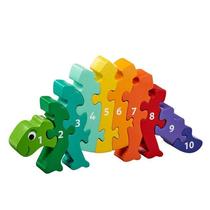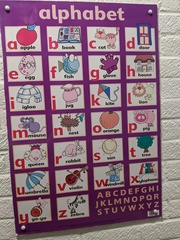My GCs loved Number blocks and Alpha blocks. You can buy the blocks.
Gransnet forums
Grandparenting
Toddler learning - letters and numbers
(60 Posts)My DGS is 2 3/4. He is showing interest in numbers and letters and I want to get him some toys to encourage his learning. I was going to buy him counting cubes, but they are a little small for him (choking hazard and he is only 2). I AM going to buy magnetic letters for his easel.
Has anyone else got any ideas? I am not with them at the moment, although from the summer, I am returning to the UK and will home school him on non-nursery days (supposing nursery is covid safe by then) so ANY ideas are welcome.
Thank you!
How about using colouring for pencil skills? It helps to practice those fine motor skills they will need later for writing.
Taking children to the library is a great way to get them out. Get them talking about what they can see, touch, hear, smell and even taste (if you are in the countryside). I spent time with the GCs talking about plants and trees, what could be touched and what not to touch. The library provided access to lots of different books. Some libraries used to run story time or singing groups for pre-school children.
Most children are like sponges especially if they are interested. CBeebies as already mentioned has learning for pre-schoolers. Lots of playing with paper, felt tips, glue and scissors etc. plus cooking. In fact anything that will encourage personal development.
Just have fun with whatever you decide to do with your GCs.
I make a point of never buying my GC educational toys - I go for fun and imagination. Time enough for acquiring formal knowledge. They are only tiny once and their greatest asset at this age is their imagination and sense of fun. Buy him a whoopee cushion or some tools for playing in mud!
How about the first word spoken by the " Royal" Archie ?
Crocodile ! Yes. not mama/ dadda, but Crocodile.
A scholar in the making. I wonder what prompted that 
I would recommend Numberblocks on BBC I player in addition to all teaching aids recommended.
'Numberblocks' are too big to swallow, available on Amazon and there are Cbeebies programmes available and DVDs.
On a different tack, apparently now Early Years children are taught upper case letters too as they are spikier and so, easier to learn to write.
DGS2 is almost 3. He loves the books "10 little ...." dinosaurs, pirates, monsters etc and can also get "10 little DGS2" though more expensive. They count down and each page has different things to count - jellies, spiders, ghosts, poo (dinosaur book) and so on. At the end there is a page for counting with 1, 2 3 whatever the theme is up to 10. Also great fan of Orchard Games although he has his own "take" on some of them. DD1 uses these games a lot. She teaches P1 (5 year olds - Scotland). She also uses jars with plastic tweezers and pom poms. You put the pom poms into the jars - can be counting, colours, sizes and helps fine motor skills as well. She gets supplies from eBay, Hobbycraft and her local woods.
I used to buy Galt toys ,lots of educational stuff there,when I ran a playgroup we had to fund raise to get them as they were quite expensive .I dont know if they are still around but they were certainly well made and useful for the stage you are at with your GC
This puzzle helped my DGD with numbers and colours and they enjoyed doing it over and over again.
www.ebay.co.uk/p/1394356555
My DC also had an old-fashioned wooden abacus:
www.amazon.co.uk/Melissa-Doug-493-Wooden-Abacus/dp/B00005BVRQ/ref=asc_df_B00005BVRQ/?hvlocphy=1007432&linkCode=df0&hvptwo&psc=1&psc=1&hvnetw=g&hvadid=226614177296&hvpone&hvlocint&th=1&hvpos&hvdev=t&hvdvcmdl&hvqmt&tag=gransnetforum-21&hvtargid=pla-369216602291&hvrand=11995356660828569287
schools took a very dim view of children learning to read and write at home, as a lot of them had been badly taught and it took ages to correct their faults
If children can read and write, I don't see where the 'faults' are, that need correcting. I think it's more a case of teachers labelling themselves 'professionals' and getting irritated when they find that parents can do the job of teaching reading and writing with no particular training and with equal success.
Maizie.
Autocorrect gave me Maisie, Naize, and a couple of others but I knew they were wrong on sight..
Actually Marie, I see and read in ‘whole’ words all the time. The only time I employ phonic skills is if I have to read aloud. With your word, I have memorised the whole thing and could reproduce it and recognise it again but I don’t have a clue how to pronounce it. Didn’t bother. Just put the whole thing in my head in a second.
?
Gagajo as he has delayed seech has anyone considered teaching him Makaton? My GCs learned this at nursery because it is becomng accepted as a way of encouraging early communication for all children not just those with speech and language difficulties. There are some lovely on-line videos Makaton with Lucinda -how to sign "dinner" www.youtube.com/watch?v=8tGXBLTZtD0
Sometimes toddlers just don't need to speak. Especially if they are the only child around.
Try giving her choices all the time (without showing them to her) e.g. do you want your red socks or yellow socks, apple or banana. She is still quite young and hopefully the speech therapist will put your minds to rest.
Glasgowgal, my second son remained mute until he was two-ish - his chatterbox elder brother did all his talking for him. We had an speech therapy appointment set up. Then one day when brother was at nursery, I had second son in high chair behind me while I loaded the dishwasher. Suddenly a clear voice behind me said “Mummy, please can I have another bit of toast?”
I jumped out of my skin. Turns out second son had been talking fluently to big brother in bed at night, but neither of them had given me any indication that he could talk.
I am so worried about my GD she was 2 in January and is not speaking yet she makes sounds but doesn’t say any words at all.
She is very bright in other ways loves flash cards and knows all the pictures on them and most of the numbers too but just doesn’t say anything. She understands every word you say too.
My daughter is also very worried of course and has an appointment with a speech therapist next week. GD loves books has been read to she was months old. And we speak to her and play with her all the time.
Has anyone got any experience of this too.
Maizie Children learn in their own way and their own time and in a manner that suits them.
I was going to suggest the orchard games.
I love them. 
That's lovely, MOnica.
It's just such a shame that at least 50% of children can't do that. They need explicit teaching from the word go. And, until they start learning to read you have absolutely no idea which of the 50%s they're going to be.
I hasten to add that this doesn't detract from any achievement of real early reading in any way at all...
MaizieD The interesting thing with DD is that it was all look and say and she got to a point where her memory could not cope with recognising anymore whole words and then there was a lapse in her reading while she figured out the phonics and then she took off again.
At that point I was active in helping her because there were a couple of wonderful Macdonald books fully of big pictures and sentences underneath describing what was in the picture, emphasising and highlighting particular phonic constructions. I left the books with her and she got on with it.
Hello Gaga yes. Maria Montessori was originally interested in “special needs” as it was. She soon discovered that the materials she was making were really great for younger children without additional needs and eventually it became a whole way of learning.
It is based very much on “doing” so you can see why it’s so great for tiny ones.
If you Google “Montessori free downloads” or similar there are lots out there (obviously you need to see what will work for you) but I know from experience that it is a really exciting way to help children learn.
The sandpaper letters are something I remember loving from being very very small myself.
There were also some lovely geometric shape sets which you could also use as templates for drawing, and later (maybe school age) Cuisenaire Rods and beads. SO lovely!
Anyone, especially those with an interest in early years should take a look.
A wooden jigsaw, paper and crayon and your time and attention is all you need. Count everything with him all of the time and by February he will be able to count to 20. Once he has mastered that, buy him a little note book and write 1 -20 inside using a single page for each number. When he counts anything show him the number written down. Come Easter ask him to find the number in the book. Once he manages that use a yellow felt tip and write the numbers on sheets of paper then let him copy over the top with a crayon. Jobs a good un. No great expense, no faff just plain simple straight forward teaching.
I think learning songs and stories is a more useful skill. A wide ranging vocabulary is always a bonus!
We have these posters low down on the wall in the hall. The children love them and will study them for ages.
This afternoon a three year old has enjoyed sounding out the initial letter sounds and then we took it in turns to look for the same letter in the other words. Great fun!
Join the conversation
Registering is free, easy, and means you can join the discussion, watch threads and lots more.
Register now »Already registered? Log in with:
Gransnet »



